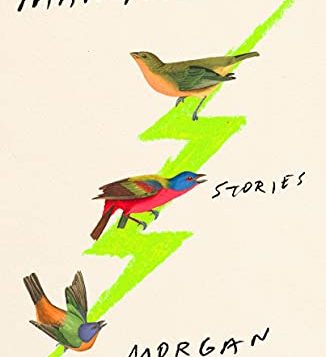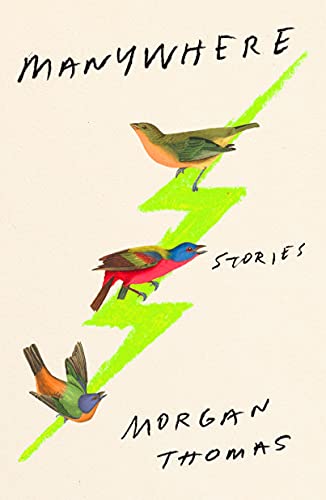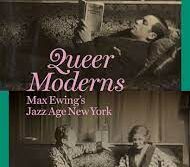“THE SOUTH” as a geographic designation is apparently expanding. In the face of climate change and sea level rise, the region is reaching beyond old Mason-Dixon borders and the Gulf of Mexico as far as Ellis Island—or perhaps Canada. That, at least, is the impression one might get reading Manywhere, a remarkable collection of nine compelling stories that author Morgan Thomas views as rooted in the South. At the same time, the book’s restless seekers, living in pockets of Virginia or Louisiana, Georgia or Alabama, rove beyond conventional boundaries, taking fresh approaches to asserting identity through connection.
Thomas, who was born in Little Rock and grew up in Florida, holds an MFA in fiction from the University of Oregon and is currently a Southern Studies Fellow in Spartanburg, South Carolina. The writer identifies as “genderqueer and queer,” and Manywhere is their first book. Thomas has said that questioning “the rules determining who and what can be loved, in what ways, and how much” is “part of the work of queerness,” and these stories take up the task with attention and verve. Manywhere brings to mind such classic short story collections as Winesburg, Ohio, by Sherwood Anderson, and Flannery O’Connor’s A Good Man Is Hard to Find. However, Thomas delves deeper than loneliness and steers clear of grotesquerie, adding empathy to a narrative mix in which ordinary queer and trans persons work to build fulfilling lives in tough circumstances.
How does Thomas pull it off? Writer-activist Audre Lorde identified a human need “to develop tools for using [people’s] differences as springboards for creative change,” and Thomas applies such tools in Manywhere. Several stories reveal, for example, how episodes from queer history hold resonance for LGBT people today. The author also dramatizes how heteronormative behaviors, dress, and language impact the psyches of LGBT people, as when they have to negotiate the waters within their biological families. Three stories illustrate these themes. “Taylor Johnson’s Lightning Man” opens the collection. It is October 2008. The narrator, a genderqueer person from Louisiana, is in New York City combing through immigration archives for information about Mary Johnson, who had sailed from London to New York exactly 100 years before. Reading news accounts of Johnson’s arrival at Ellis Island in 1908, the narrator is jubilant at what they confirm: the immigrant had disembarked in New York dressed as a man and claiming the name Frank Woodhull, peddler of “books, lightning rods and toiletries.” Inspection officials reportedly regarded the well-off Canadian Protestant as “a desirable immigrant,” assuming that Johnson had simply “adopted men’s clothes to get along in the world.” Learning this, the narrator is surprised that the newcomer soon took off for New Orleans. I’d have stuck around New York for praise like that, they say. The story goes on to reveal the narrator’s joy at finding historical evidence for the “lightning man,” whose experience offers a measure of reassurance for their own life. “I liked your story because I suspected … you weren’t a woman or a man,” the narrator says. “You were a lightning man with a knock like thunder. I felt close to you.” A second story, “Bump,” was originally published in The Atlantic. Thomas has said that their aim in “Bump” was to “expand visions of queer and trans desire” and people’s sense of “caretaking, of that which is worthy of care.” The idea for the story came up during a conversation the writer had with two friends, a cis woman who didn’t want children and a trans woman who did. Both women expressed grief “related to the entangling of womanhood with motherhood,” Thomas says, and “Bump” was written to “explore that shared grief.” Narrator Louise, a trans woman, is a software developer who lives in Atlanta and cares for her grandmother in the apartment they share. Active on Facebook, Louise is also romantically involved with Len, a married lawyer who calls her Louie. Len’s wife had been okay with Len’s affair, but cooled after giving birth to their son. Louie longs to be pregnant too—not necessarily to have a child, but to go through the ritual of pregnancy. Impulsively, she orders online a pair of stuffed “bumps” mimicking four- and seven-month pregnancies. She straps on the smaller bump and wears it to the office, tripping a cascade of giddy rumors that she does not dispel. Thomas’ take on the workplace is slyly funny. For example, Louie is pressed to join the “Code Like a Mother” yoga group whose leader “had studied for twelve years in an ashram in California, paying for her teacher training by working remotely as a hacker for an American finance company.” At her first session Louie bends forward as instructed and feels a bump strap pop. She runs for the bathroom and the scene collapses. A third story, “Manywhere,” which first appeared in The Kenyon Review, begins and ends in Perdido, Florida, where narrator Charlie Vickers, a trans man, has recently taken in his homeless, estranged father, John Leroy Vickers. John fantasizes he is a trekker, rambling through the eastern U.S. and approaching Quebec, atlas in hand—without actually leaving home. “My father walks circles around my kitchen,” Charlie explains. More troublingly, John rejects Charlie’s trans identity, pushing him instead to be the daughter he knew as Charlotte. Charlie narrates vivid backstories of his parents’ romance and divorce, of living with his mother as a child, of hiking with his father as a teen, and of his college and young adult years, up to when he had found a partner six months earlier. Now the partner has left, unable to put up with the elder Vickers’ delusions. Charlie feels his own chance for a real life might require walking out too, but he hesitates because his father needs care. Suddenly, he recalls meeting a woman recently who was a close fit in age and size for the daughter his father craves; amazingly, she had a backpack and talked about hiking the Appalachian Trail. The idea of replacing himself with this chanced-on “daughter” takes hold, and Charlie’s frenzied engineering of the feat brings him to a new place. The six remaining stories in Manywhere are similarly nestled in the South. They display the challenges of a gender-conforming world—set off by an array of doggedly inventive queer and trans responses. Written with openness and generosity of spirit, the collection is an imaginative tour de force.
Rosemary Booth is a writer and photographer living in Cambridge, MA.






